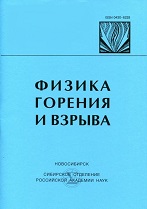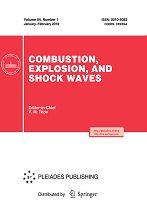|
Effect of heat losses on boron particle combustion in a high-temperature air flow
A. P. Shpara, D. A. Yagodnikov, A. V. Sukhov
Bauman Moscow State Technical University, 105005, Moscow, Russia
Abstract:
The effect of heat loss on the possibility of implementing the most effective gas-phase combustion mode of a single boron particle in air at various initial temperatures and pressures of the oxidizing medium is analyzed analytically, taking into account the possible entry of the particle into the air environment, the temperature of which is lower than the melting point of boron, after its ignition and reaching a stationary gas-phase mode combustion. A method for calculating the maximum initial air temperature below which cooling and extinguishing of a burning boron particle occurs has been developed, and the boundaries of the regions of its gas-phase combustion and extinguishing have been determined. It has been established that when a single boron particle burning in a gas-phase mode enters air with a temperature below the melting point, the main factor determining the mechanism of its combustion is the air temperature, depending on which either the continuation of combustion of the particle in the gas-phase mode or its cooling takes place and changing the combustion mode to heterogeneous.
Keywords:
boron, particle, modeling, ignition, combustion, heat loss.
Received: 19.12.2022
Revised: 25.05.2923
Accepted: 11.10.2023
Citation:
A. P. Shpara, D. A. Yagodnikov, A. V. Sukhov, “Effect of heat losses on boron particle combustion in a high-temperature air flow”, Fizika Goreniya i Vzryva, 60:2 (2024), 39–46; Combustion, Explosion and Shock Waves, 60:2 (2024), 178–184
Linking options:
https://www.mathnet.ru/eng/fgv4270 https://www.mathnet.ru/eng/fgv/v60/i2/p39
|


| Statistics & downloads: |
| Abstract page: | 30 | | References: | 11 |
|





 Contact us:
Contact us: Terms of Use
Terms of Use
 Registration to the website
Registration to the website Logotypes
Logotypes








 Citation in format
Citation in format 